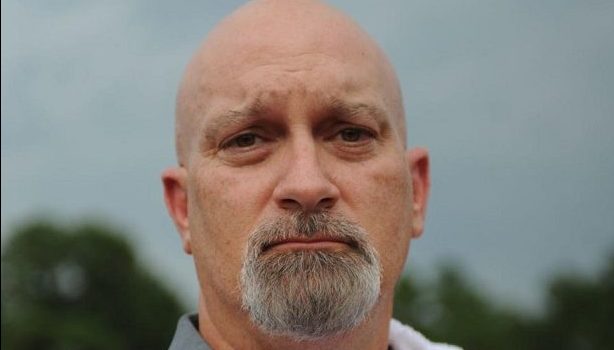Deemed As The “Katrina” Team, Coach Jerry Leonard Remembers the Football Team That Saved Salmen High School
August 29th will mark the 15-year anniversary of Hurricane Katrina. The storm that changed the landscape of many things in Louisiana, including high school football.
Jerry Leonard has covered a lot of real estate at Salmen High School in Slidell, Louisiana. The former Salmen High football standout returned to his alma mater, where he’s served as, biology teacher, driver’s education instructor, defensive line coach, linebackers’ coach, defensive coordinator, head coach and currently holds the assistant principal position. It would explain why he went through great lengths to produce a football team post Hurricane Katrina. The school has been embedded into his life since he was a teenager. In fact, what Coach Leonard pulled off in 2005 was nothing short of a miracle. The effort and hard work that he expects from his athletes, proved to be much more than just expectations, but something he lives by as well. It wasn’t easy, but necessary. How many lives did he save by producing a football team during those traumatic times? Keeping those players off the streets which were full of uncertainty and an eerie emptiness post Katrina was detrimental not only to Salmen High School, but an entire community. All anniversaries aren’t meant to be celebrated. Some simply serve as a reminder of the sacrifices made during trying times.
During my recent conversation with, Coach Jerry Leonard, he recalls the aftermath of Hurricane Katrina 15-years after its destruction left more questions than answers at Salmen High School.
August of 2005, just before Hurricane Katrina made landfall. From a football standpoint, where were you guys?
Jerry Leonard: We had just played a jamboree against Slidell High. When we got off the field that night, people were talking about the possibility of this storm heading our way. There was still some uncertainty with it, so we went into work Saturday morning. The indicators were still pointing to it coming our way and having some kind of effect on us. It had not built up to the strength that it did when it made landfall, but it was significant enough for us to end things early on Saturday, prep wise and make some type of preparation as far as picking up the field house and getting some things off the floor just in case. Everything that we had done ended up being in vein because it was catastrophic with 7 ½ feet of water in the field house, and a lot of things being destroyed. Looking back on it, just didn’t see it developing and becoming what it did become. We knew about it when the jamboree was finished and the first game, obviously never happened.
Living here in Louisiana, we all do it, we watch forecast and projection predictions and then we make a decision, stay, leave, send the family away. What did you decide once you realized the severity of the storm?
Jerry Leonard: Maybe 12-18 hours became kind of a blur almost because I never evacuated for a storm before. So, I wasn’t planning on going anywhere for this one. I had two young children at the time, my wife’s parents were in town, and they had never left for a storm before either. I woke up some time after midnight the morning it was going to hit. I saw where it was headed and what it had become, and I woke MeMe up, told her to get the kids, get a bag and call her parents because we were getting out of here. We got on the road… probably 3 or 4 in the morning. Roads were jammed packed. Everybody was trying to go west towards Texas. I ended up talking to her and getting on the phone with her parents and telling them to head east. We headed towards Florida and made our way somewhere between Pensacola and Destin. We laid low there until the storm passed. The next day, I left them there and I drove home. They stayed there until I was able to go back and get them a couple of days later.
Communication was tough because cell phones weren’t working properly, inaccurate reports on several news stations. What were you expecting when you returned, and did it meet expectation according to what you were hearing?
Jerry Leonard: Driving back, I had seen some reports on TV about our area. I didn’t know what to expect necessarily coming back. What I saw on TV was some flooding and wind damage, like a normal storm would be. As I made my way home, things progressively got worse and it was harder and harder to get all the way into Slidell. Luckily, I knew a couple of former players that were in law enforcement in our area. I had some of their numbers and the thing that was working, if you remember the old Nextel chirp. Nextel chirp was working. That’s how I was able to communicate not only with my family when I left, but also some of the guys who had stayed back. Coach [Danny] Monjure was one of them. He stayed back. He was in, what he felt like was a high and dry area, along with a couple of former players. So, I was communicating with them. When I got back, it was like a war zone. It was like a bomb had been dropped. What I saw on TV didn’t do justice to the damage that I saw when I got here. It was everywhere. Words couldn’t describe how much and how vast the damage was.
Went by my house and my house didn’t take on any water but had some wind damage; had a few tornadoes pop around, but I was able to get in it and we can live in it. it needed some work, but it can be lived in. Went to my in-law’s house, they had 4 ½ feet of water; couldn’t live in that. After I checked out those two houses, I went to Salmen [High School]. The field house had taken on 7 ½ feet of water. About 3 or 4 inches of mud was inside it. The weight room, same thing. Fish, snakes, you name it, there was stuff in there. The smell was bad. Some of the snakes were still alive, obviously the fish were all dead and starting to stink. Mud was everywhere. I remember Coach O’Shaughnessy, Stephen met me over there to help me access the damage. We saw the mud everywhere in the field house. I found a box of towels that had floated by. When the water went down, it was still sitting there and some of the towels in there were still dry. We took the towels out and started trying to clean the floor where the “S” was, so we can see the “S” again on the floor in the locker room. That was a heart wrenching situation because the season had so much promise. We thought we had a heck of a team that could probably make a run. Knowing that that probably wasn’t going to happen and seeing how damaged the field house was hit hard. That was my home away from home. I spent a lot of time there. That was a gut check. I just didn’t know where we were going from there. There was a lot of uncertainty after that.
As a parent, obviously your family was first priority, as a football coach with an obligation to your players and coaching staff, where was your mind at the time? Did you even have time to process potentially not having a season?
Jerry Leonard: I knew there were a lot of things that needed to be done. I wanted to get home and get things back going as soon as we could. To get some type of routine back in order again, and some sense of normalcy. I knew that was going to be a process. I wasn’t sure how long that was going to take, but I knew we needed to get started. I had to wait for direction from, Byron Williams our Principal. To find out what was going to happen with the school because the entire school took on 7 ½ feet of water. We didn’t have a school to come back to and most of the homes that were in our attendance zone were damaged by water as well. You had a lot of families that were displaced. The first order of business was to try and get my family back to Slidell. Once I saw that our house was able to be lived in, I had to start working on my in-law’s house with repairs and having to gut it and all that kind of stuff. You prioritize things and you figure out, what can I do right now. Those were some of the things that were priority that we could get started. I think that’s the direction we headed in. I was in contact with Mike Leland my athletic director, my coaches and as many players as I can get a hold of. We were just all trying to help each other cope at the time, I guess. Prioritize our lives and try and get things back going again, which the primary priority was getting homes gutted and get things to a place where they could be repaired. Nothing was up and running. You couldn’t get gas, you couldn’t get materials, you couldn’t get anything.
At some point, football is back on the table, you wanted to get back to it, but you had to have a union of players who wanted to get back to it as well. How did the ball get rolling with even entertaining playing football again?
Jerry Leonard: The way it came down, Byron, and me, and Mike Leland were able to meet. We met by the cafeteria one day of the old school. We all came to drive around and kind of check things out. We all had the Nextel chirp, so we were able to communicate with each other. We all met over there, and I remember, Mr. Williams saying, “I hate to even mention it, but I don’t know if the school is going to come back.” And I said, “Well, we gotta get the school back.” He said, “Well, I don’t know if it can come back unless we can field a football team.” And I said, “Let’s field a football team then.” He kind of looked at me like I was crazy, “How are you going to field a team? You don’t even have a ball. You don’t have players, you don’t have equipment, you don’t have anything.” So, we agreed that he would let me do what I had to do to try to get kids and equipment and move forward with trying to get those things done. And he would work on making sure people were on board to try to make sure the school came back. So, we both did what we had to do.
I remember I called a practice with the guys who I could chirp. I called them and told them I was going to try to get together if they could and if their parents were all for it. Their parents were for it, so we ended up meeting at a field. I remember I had one of LJ’s, my son’s little miniature football that he was throwing at the time. I went out there with that. I had 17-kids show up. Of a team that had either 83 or 86 on the roster for the jamboree. But I had 17-kids show up. We sat around, man. We didn’t do any football. We fiddled around with that little football playing pitch and catch and we just talked. Everybody were able to tell their own story about what they had gone through, what they had been through and what their house was like. We kind of left there saying, spread the word, we’re going to try and get back together again. We started practicing. So, in the mornings, we would go by and help each other in their houses, gutting houses, and things like that. in the afternoon… because they weren’t in school at the time, we would try to get together for 45 to an hour and go over plays and talk about football a little bit. But football wasn’t a priority, it was an outlet. It was an outlet to be normal.
I’m sure the initial schedule went out of the window; how did you go about scheduling games?
Jerry Leonard: Most of the teams on our schedule was from Orleans Parish. So, I’m thinking, we are we going to do about games? None of those schools were coming back, so I didn’t have a schedule. I didn’t have equipment. I didn’t have anything. So, I started calling some vendors that I had dealt with and told them, I need this, and I need that. I needed everything. I said, “I don’t know when I’m going to pay you, but I’m going to pay you at some point. But I need to get stuff as soon as I can.” Started working on that. I started calling some coaches about getting games. Found a few games. I didn’t know when we were going to play, but we were going to try and play. Found a few games here and there. Ended up with a 6-game schedule. Played Lutcher twice that year, had a game with West Jeff, and a couple of other schools that had came back. Ended up playing the first game at West Jeff with 23-kids. We got beat, but we got on the field and we made it happen.
So, gradually some kids heard we were coming back and that we were back, and they wanted to come back, but they didn’t have a place to live. So, a couple of them came and lived with us, and their parents were okay with it. One of them was in Kansas, parents got him a bus ticket, got on a bus and came back to Slidell. One of them was in Alabama, came back and lived with me. They stayed with me until their parents were able to get back home and get their houses back up and running. They became part of my family. They did their homework at the table with my kids. They ate dinner with us. And they still to this day consider, Samantha and LJ their sister and brother and my sons. It was a different time, but you know that old saying, ‘It was the best of times it was the worst of times.’ That’s just how it was. We made the most of it. We made some great and lasting memories at that time.
I know how competitive you are and how much you love to win. It’s the only way for you. You knew you were at a disadvantage because you had so many kids that didn’t return. Did it get to the point where it wasn’t about wins and losses, but just taking advantage of an opportunity to put kids on the field to compete?
Jerry Leonard: I guess everybody knew that. As a football coach my job is to try to win. As much as we knew it wasn’t necessarily the most important thing at that moment, it was still, we were trying to win a football game. We were trying to have some success. We wanted those kids to have something to hang their hats on. It was crazy, man. We were in a few games, but we just didn’t have enough gas in the tank to finish and find a victory on the field necessarily. But those kids were winners and they saved Salmen High School in my opinion. We were the only team in our district to field a football team that year. So, we went into the playoffs as the district champions.
So, we had the pleasure of going to Bastrop for a first-round playoff game. At that point, we were the #32 seed going to play the #1 seed, and again, those kids got out there and they battled. We got up on them early and then they ended up blowing the doors off for the rest of the game. But those kids battled every game. They did the best that they could. They fought for each other. I guess in a sense we knew that it was more important to be out there and to be with each other and to bust their butts for each other. Not necessarily to focus on the wins and losses. But you wanted to try and win and that’s what we tried to do, but there were some much more important things going on in our locker room and in the daily lives of our kids then just trying to win a football game. I don’t want to say it got put on the backburner, but when you prioritize things, that at the time wasn’t necessarily priority. The priorities for us were finding that sense of normalcy, having that team camaraderie, being a family and getting families back in houses and getting kids back in school. And we were able to do that. So, from that standpoint and all those other pieces of the puzzle, we were successful.
What did you learn the most about yourself that year?
Jerry Leonard: That’s tough. There were a lot of lessons learned. I think the most important one for me was, you put your money where your mouth is. You talk family, you know a lot of teams talk family. “We’re a family and our team is a family. We’re going to be there for each other.” They talk all that stuff, but I have always lived by the motto “TIC,” Talk Is Cheap! So, I learned during that year, those aren’t just idle words that people say. That’s what we lived. I learned that our team really was a family. I have always told my coaches, “I want you to treat every kid on the team like he was your own.” That’s what I tried to do. So, I think we learned that year that, there are far more important things… even though we focus a lot on winning, there are more important things than just winning a football game. The most important thing was making those kids understand that we were there for each other and that we were a family, and that we can get through anything. We found a lot of truth in some of the things that we were preaching. “Tough times don’t last, tough people do.” We found truth in that. The quote that we used a lot was from Dr. Martin Luther King Jr. “The ultimate measure of a man is not where he stands in moments of comfort and convenience, but where he stands at times of challenge and controversy.” That’s what we were in. we were in some tough times. We found truth in a lot of the things we preach. The kids will still come back to me and quote that. There were so many lessons to be learned, but mostly, when you say something mean it, and when it’s time to be counted on, be counted on and be there for each other.
Why Coach? Why even go through all that? Why not just move on, forget about football until you relocated and start over?
Jerry Leonard: The players are the reason why I felt motivated to do the best that I could and the coaches do the best that they could for those kids, because that team to me and a lot of people ended up saving Salmen High School. They were the bricks, the foundation that built the school back up. But it was two types of kids that we were left with, and that’s what to me is so important. Number one, in order to come back and play for Salmen after [Hurricane] Katrina, you had to really want to want to be there. You know what I’m saying. You had to make an effort to come back, go through all of that crap to be a part of the team again; knowing what we had and didn’t have at the time. The second type of kid that we had, were the kids that had nowhere else to go. They couldn’t leave. They had nowhere else to go. They were stuck here. To me, those two types of kids that we had on that team, the ones who wanted to be here that bad and the ones that had nowhere else to go, I felt like we owed it to them, to give them our absolute best. And to make it the absolute best we could for them.
You know how I feel about you, we truly have an unbreakable bond and I’m always a phone call away. Thank you for your time. Continue to inspire and be the great man that you are. Is there anything else you would like to add?
Jerry Leonard: We come from a unique situation at Salmen High School that a lot of people don’t understand. Being that I’m a Salmen graduate, the place is more near and dear to my heart than some people. I think that every kid that comes through there, whether they played football or not, but especially if they played football, understands the love and the passion that we have for Salmen and for the guys who put the blood, sweat and the tears on the field, and in the weight room and everywhere else. So, I think it’s such a unique family and it’s a great family to be in. I’m just glad I’m a part of it. I’m honored to be a part of it.
Tweet




























